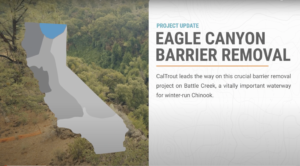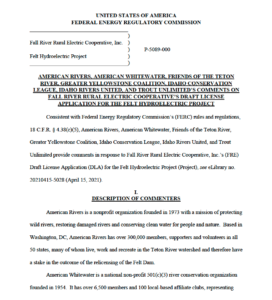Coalition Members Oppose Waiver of Clean Water Act Cert for Yuba River Development Project
Hydropower Reform Coalition members California Sportfishing Protection Alliance, South Yuba River Citizens League, Americna Rivers, American Whitewater, Friends of the River, California Outdoors, Trout Unlimited, and Northern California Council of Fly-Fishers, in partnership with allies in the Foothills Water Network, have filed a Response in Opposition to Yuba Water Agency’s Request for Waiver of water quality certification for the Yuba River Development Project. The Network filed its letter with the Federal Energy Regulatory Commission (FERC) on April 2, 2020. Waiver of certification would place a 40-to-50-year restriction on the state of California’s ability to regulate operation of this huge hydroelectric project on the Yuba River.
FERC is conducting a proceeding to relicense the Yuba River Development Project. The applicant to relicense the project is Yuba Water Agency (formerly and still referred to by FERC as Yuba County Water Agency, or YCWA). Section 401 of the federal Clean Water Act requires an applicant to obtain a certification by a state agency that operation of the project under a new FERC license will be consistent with the state’s standards for water quality and protection of “beneficial uses.” Section 401 allows the state to place conditions in the FERC license to assure this consistency and protection. In California, the State Water Resources Control Board (State Water Board) is responsible for issuing 401 certifications for hydroelectric projects.
The Clean Water Act imposes a one-year deadline for a state to issue a 401 certification. Failure to meet the deadline results in “waiver:” the state loses its chance to place conditions in the FERC license. The statute itself does not define when the one-year clock starts. In the past, FERC had a de facto policy of allowing applicants to withdraw applications for certification and resubmit them before the clock ran out. This avoided denial of certification by the state.
In January 2019, the U.S. Court of Appeals in Washington D.C. found in Hoopa Valley Tribe v. FERC that the State Water Board had waived its right to issue certification for the Klamath River Hydroelectric Project. The Court held that the State Water Board had made an illegal agreement with the owner of the Klamath project to delay certification to allow time for parties to complete a settlement of issues.
Since the ruling in Hoopa Valley Tribe v FERC, FERC has issued a series of orders expanding the application of the Court’s decision. FERC has found that when applicants withdrew and resubmitted applications for certification, this amounted to waiver, even without an explicit agreement between applicant and the certifying state agency. FERC has applied its new criteria retroactively, even for cases when states had already issued certifications.
YCWA’s Request for Waiver joined the parade of filings by hydropower operators that seek to avoid state oversight.[1] But YCWA has a problem. Issuance of a 401 certification requires analysis under the California Environmental Quality Act (CEQA). YCWA chose to be the Lead Agency for CEQA for the 401 certification of its project. That means it promised to produce a CEQA document, such as an Environmental Impact Report or an Environmental Assessment. But YCWA has not even started, let alone completed, a CEQA document to support the State Water Board’s decision on 401 certification.
The Foothills Water Network’s comments therefore conclude:
The record shows that the State Water Board has diligently acted in processing YCWA’s application. Contrary to YCWA’s assertions, the current delays in the 401 proceeding are due to YCWA’s failure to provide information necessary to fully evaluate the Project’s potential impacts on water quality over the term of any new license by preparing the environmental document required under state law.
The Commission should find that the California State Water Resources Control Board has not waived Clean Water Act § 401 Water Quality Certification for the relicensing of the Yuba River Development Project. On the contrary, the Commission should order YCWA to complete CEQA and submit a new application with a completed CEQA document forthwith, or, in the alternative, deny YCWA’s application for relicensing the Yuba River Development Project for lack of diligent prosecution.
[1] For a description of other such requests and CSPA’s earlier responses, see CSPA Defends Section 401 of the Clean Water Act at: http://calsport.org/news/wp-content/uploads/bsk-pdf-manager/2019/12/2019-08-Summer-Edition.pdf


